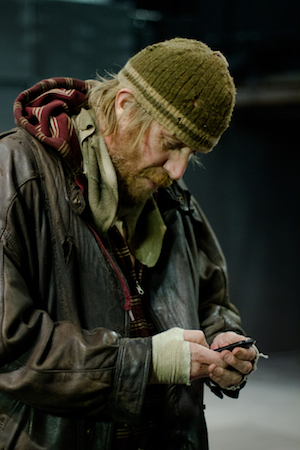Protest Song, National Theatre | reviews, news & interviews
Protest Song, National Theatre
Protest Song, National Theatre
Rhys Ifans shines in Tim Price's view from the Occupied steps of St Paul's

Rhys Ifans enters as a rough sleeper who has wandered in off the street, his sleeping bag over his shoulders, beany hat pulled low over unwashed hair, muttering to himself. For a moment he's hardly noticed by the audience, ignored as such people often are, but then he launches into Tim Price's monologue. He is Danny, an alcoholic.
Ifans convincingly inhabits the skin of a self-absorbed loner, angry with "the system", with just about everyone he meets, with himself for messing up his life and losing contact with his son, hitting out verbally with a fury that could at any moment disintegrate into tears. He has been issued with a mobile phone, the symbol of belonging to respectable society. If he can hold on to it and use it sensibly he will have earned a place in a hostel.
 The stage and set are black, empty. The Shed is a space in which Danny's story can be told, but there is a difficulty here. There is no escaping the fact that we are an audience and Ifans is an actor; however accomplished he is, we are not encountering a real rough sleeper. His approaches to individuals, asking for money or for their phone numbers (to give his mobile the appearance of use) depend on people gamely play-acting, which in turn causes giggles. This is taken to an almost ludicrous degree when Danny leads his gleeful "friends" in an adapted version of "The Twelve Days of Christmas": "On the first day of Christmas, the system gave to me a vote in democaracee". Subsequent days provide two racist cops, three student loans, four bailed banks, six hackers hacking and seven drones a-bombing. But the fifth day is the memorable one, declaring (not for the first time in the evening) that Boris (Johnson) is a cunt. Serious consideration of social injustice has disappeared in favour of puerile chanting. And Ifans's brilliant characterisation in Polly Findlay's lively production has given place to pantomime.
The stage and set are black, empty. The Shed is a space in which Danny's story can be told, but there is a difficulty here. There is no escaping the fact that we are an audience and Ifans is an actor; however accomplished he is, we are not encountering a real rough sleeper. His approaches to individuals, asking for money or for their phone numbers (to give his mobile the appearance of use) depend on people gamely play-acting, which in turn causes giggles. This is taken to an almost ludicrous degree when Danny leads his gleeful "friends" in an adapted version of "The Twelve Days of Christmas": "On the first day of Christmas, the system gave to me a vote in democaracee". Subsequent days provide two racist cops, three student loans, four bailed banks, six hackers hacking and seven drones a-bombing. But the fifth day is the memorable one, declaring (not for the first time in the evening) that Boris (Johnson) is a cunt. Serious consideration of social injustice has disappeared in favour of puerile chanting. And Ifans's brilliant characterisation in Polly Findlay's lively production has given place to pantomime.
The picture Danny paints of the earnest protesters, with their organised kitchen, committees and library is poignant and funny. Here are people with the highest ideals who are not necessarily any more socially capable than Danny himself. In the end they are simply other human beings, after all, and he can't, of course, fit in. He gives examples of the poor and disabled suffering under Government policies but it is difficult to believe that Danny (as opposed to Price and Ifans) would care much about them. Price (known for other work on controversial topics such as the Bradley Manning case) has said in an interview that he worked closely with Ifans and included his ideas, especially on audience participation.
Danny's tragedy - and when Rhys gives us the straightforward portrait of an individual it is electric - is that he knows survival depends on connection with others but he can't help but be agin everyone and everything. In the end, he attacks the very fabric of the theatre too. The audience, intended to be implicated in society's failings, do not go away chastened, but leap to their feet to acknowledge a stunning performance.
rating
Explore topics
Share this article
Add comment
The future of Arts Journalism
You can stop theartsdesk.com closing!
We urgently need financing to survive. Our fundraising drive has thus far raised £49,000 but we need to reach £100,000 or we will be forced to close. Please contribute here: https://gofund.me/c3f6033d
And if you can forward this information to anyone who might assist, we’d be grateful.

Subscribe to theartsdesk.com
Thank you for continuing to read our work on theartsdesk.com. For unlimited access to every article in its entirety, including our archive of more than 15,000 pieces, we're asking for £5 per month or £40 per year. We feel it's a very good deal, and hope you do too.
To take a subscription now simply click here.
And if you're looking for that extra gift for a friend or family member, why not treat them to a theartsdesk.com gift subscription?
more Theatre
 Hamlet, National Theatre review - turning tragedy to comedy is no joke
Hiran Abeyeskera’s childlike prince falls flat in a mixed production
Hamlet, National Theatre review - turning tragedy to comedy is no joke
Hiran Abeyeskera’s childlike prince falls flat in a mixed production
 Rohtko, Barbican review - postmodern meditation on fake and authentic art is less than the sum of its parts
Łukasz Twarkowski's production dazzles without illuminating
Rohtko, Barbican review - postmodern meditation on fake and authentic art is less than the sum of its parts
Łukasz Twarkowski's production dazzles without illuminating
 Lee, Park Theatre review - Lee Krasner looks back on her life as an artist
Informative and interesting, the play's format limits its potential
Lee, Park Theatre review - Lee Krasner looks back on her life as an artist
Informative and interesting, the play's format limits its potential
 Measure for Measure, RSC, Stratford review - 'problem play' has no problem with relevance
Shakespeare, in this adaptation, is at his most perceptive
Measure for Measure, RSC, Stratford review - 'problem play' has no problem with relevance
Shakespeare, in this adaptation, is at his most perceptive
 The Importance of Being Earnest, Noël Coward Theatre review - dazzling and delightful queer fest
West End transfer of National Theatre hit stars Stephen Fry and Olly Alexander
The Importance of Being Earnest, Noël Coward Theatre review - dazzling and delightful queer fest
West End transfer of National Theatre hit stars Stephen Fry and Olly Alexander
 Get Down Tonight, Charing Cross Theatre review - glitz and hits from the 70s
If you love the songs of KC and the Sunshine Band, Please Do Go!
Get Down Tonight, Charing Cross Theatre review - glitz and hits from the 70s
If you love the songs of KC and the Sunshine Band, Please Do Go!
 Punch, Apollo Theatre review - powerful play about the strength of redemption
James Graham's play transfixes the audience at every stage
Punch, Apollo Theatre review - powerful play about the strength of redemption
James Graham's play transfixes the audience at every stage
 The Billionaire Inside Your Head, Hampstead Theatre review - a map of a man with OCD
Will Lord's promising debut burdens a fine cast with too much dialogue
The Billionaire Inside Your Head, Hampstead Theatre review - a map of a man with OCD
Will Lord's promising debut burdens a fine cast with too much dialogue
 50 First Dates: The Musical, The Other Palace review - romcom turned musical
Date movie about repeating dates inspires date musical
50 First Dates: The Musical, The Other Palace review - romcom turned musical
Date movie about repeating dates inspires date musical
 Bacchae, National Theatre review - cheeky, uneven version of Euripides' tragedy
Indhu Rubasingham's tenure gets off to a bold, comic start
Bacchae, National Theatre review - cheeky, uneven version of Euripides' tragedy
Indhu Rubasingham's tenure gets off to a bold, comic start

Comments
I feel the Author has missed